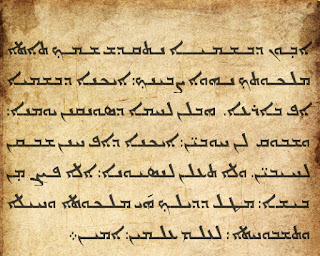sankten tu nomu
tu regnu vene
tu volu faze
in kelu i sur teru
done-mi mu panu tagus
i pardone mi debi
as mi pardone mi deberi
i ne duze-mi in tentu
mas libere-mi du malu
amen
Wikipedia. In the course of Christianization, one of the first texts to be translated between many languages has historically been the Lord's Prayer, long before the full Bible would be translated into the respective languages. Since the 16th century, collections of translations of the prayer have often been used for a quick comparison of languages.
Eulingu follows simple rules which we like to share with you looking closer at the 'Lord's Prayer':
mo patro in kelu - our father (who art) in heaven
Both 'mo' (my/our) and 'patro' (father) carry the same ending '-o' for consistency and for indicating a masculine term. In contrast 'in kelu' (in heaven) is using the neuter ending 'u'.
sankten tu nomu - hallowed be thy name
The verb 'sankten' (hallowed) is comprised of 'sankt + e + n'. While the suffix 'e' is generally expressing 'action' (mu faze - I make), in this case the final 'n' renders the active verb passive.
tu regnu vene - thy kingdom come
tu volu faze - thy will be done
in kelu i sur teru - on earth as it is in heaven
The terms 'regnu' (reign/kingdom), 'volu' (will), 'kelu' (heaven) and 'teru' (earth) all end with the neuter 'u'. Therefore the preciding word expressing possession has to finish with the identical vowel (tu regnu - your kingdom, tu volu - your will, mu lingu - my/our language).
done-mi mu panu tagus - give us (this day) our daily bread
i pardone mi debi - and forgive (us) our trespasses
as mi pardone mi deberi - as we forgive thoses who trespasses against us
i ne duze-mi in tentu - and lead us not into temptation
mas libere-mi du malu - but deliver us from evil
The actual meaning of 'mi' (we/my/our) depends on its surroundings as the 'm' indicates person (mu - I/mi - we) while the 'i' expresses the plural (in contrast to the singular and neuter 'u').
In 'done-mi' (give us) we make further use of 'mi'. By adding '-mu/-mi' (myself/ourselves), '-tu/-ti' (yourself/yourselves), '-sa/-so/-su/-si' (himself/herself/itself/themselves) to a verb, we reflect the action towards us (most of the time due to the lack of an actual object):
Mu lave-mu - I wash myself (but: mu lave mu korpu - I wash my body)
Tu ame-tu - you love yourself
Sa/so/su braze-sa/so/su - she/he/it embraces herself/himself/itself
Mi beve-mi a mortu - we drink ourselves to death (but: mi ame mi viti - we love our lives)
Ti libere-ti - you liberate yourselves
Si pardone-si - they forgive themselves
Otri eksempli:
Mu skribe mu libru primus - I write my/our first book
Mi manje mu panu tagus - We eat our/my daily bread
Mu kantete mi kanti primis in Paris - I sang my/our first songs in Paris
Mi parlele kon mi amikai in London - We will speak with our/my 'female' friends in London
done-mi mu panu tagus - give us (this day) our daily bread
The only adjective is formed with 'us' in 'panu tagus' (daily bread) with 's' indicating quality (adjective/adverb). The adjective normally follows the term.
as mi pardone mi deberi - as we forgive thoses who trespasses against us
A 'doer' can be built by adding 'r' or 'ri' (plural) to a verb - in this case 'debe' (to owe/to be in debt) - so we end up with 'deber' (debitor) and/or 'deberi' (debitors).
i ne duze-mi in tentu - and lead us not into temptation
Kes tu pense? What do you think? Was denkst du? Qué te parece? Qu'en pensez-tu? Co o tym sądzisz? Что ты думаешь?
© 2016 Eulingu


No comments:
Post a Comment